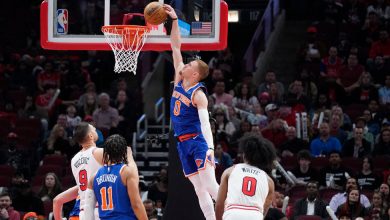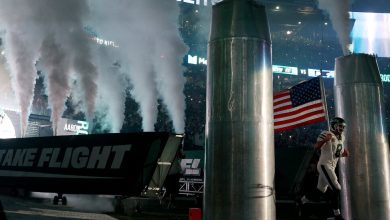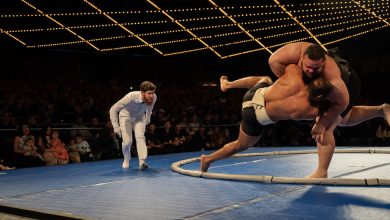Tom Brady’s Impact Was Best Measured in Goose Bumps

Not surprisingly, Tom Brady’s time in the N.F.L. spotlight had an almost fairy-tale, prescient beginning. In a Super Bowl that is now 20 years past, Brady’s New England Patriots were two touchdown underdogs to the St. Louis Rams largely because Brady was a discarded apprentice thrust into a starting role when the marquee quarterback was injured.
But a then dark-haired Bill Belichick conjured a stout defensive strategy and Brady’s competent play kept New England in a tied game until the final 97 seconds, when the Patriots took possession of the football on their own 17-yard line. They had no timeouts remaining.
John Madden, a Pro Football Hall of Fame coach and the most respected broadcaster in the land, begged Brady to run out the clock so the Patriots could await their fate in overtime.
“You don’t want to do anything stupid,” Madden, who died in late December, told his many millions of viewers.
A football legend was warning the football nobody. Brady did not listen. He completed three passes and the Patriots moved into Rams territory.
“This guy is really cool,” Madden said, foreshadowing two decades of Brady as a pitchman for everything from Tag Heuer watches to Aston Martin sports cars.
Brady next fired another perfect pass for 23 yards.
“Amazing,” Madden, now a believer, gushed. “They are letting it all hang out.”
After another Brady completion, a 48-yard field goal on the game’s final play gave the Patriots their first Super Bowl victory.
“What Tom Brady just did gives me goose bumps,” Madden said.
Brady’s star could not have shone brighter if he had been knighted at the 50-yard line.
In a postgame interview, Brady’s face was flushed, his hair tousled like a child coming in from the playground. He was informed that Madden, before the game’s final drive, had insisted that the Patriots should be playing conservatively, settling for overtime.
“Madden was worried you’d do something stupid,” a reporter said.
Brady, then 24, looked wounded at first. Then he considered what he’d just done.
Smiling impishly, Brady said Madden, the game’s biggest celebrity at the time, was wrong. Brady added: “I can say that, right?”
He could at that moment, and for the next two decades, he could say almost anything he wanted. Brady’s stardom and his football wizardry became profoundly entwined with the narrative of the cultural monolith that the N.F.L. would become over his career.
On Tuesday, Brady retired, the last simple gesture in a fabled pro football life so complex, productive, triumphant and relevant that he became one of the best known — and occasionally reviled — people in America.
Typically calm on the field and stylish off it, he started more N.F.L. games, won more championships, set more records than nearly all of his peers and was somehow involved in multiple scandals ending with the suffix “-gate.” Mostly, he let the goose bumps accumulate in his wake. Brady will take his place in a separate wing of the pantheon of North American sporting greats reserved for the likes of Michael Jordan, Muhammad Ali, Serena Williams, Babe Ruth, Wayne Gretzky, et al.
Perhaps for longer than any other person, he was the face of the N.F.L. during a period that saw the league vault to a pre-eminent status among sports played in the United States.
His games, during 20 seasons in New England and two with the Tampa Bay Buccaneers, were routinely chosen for national broadcasts. Player rivalries did not seem to matter as much unless Brady was involved in the pairing. It was usually Brady versus Peyton Manning, Brady versus Aaron Rodgers, Brady versus Drew Brees.
Brady won seven Super Bowls and appeared in 10, but even his defeats in the N.F.L.’s season-ending showcase became highly notable, especially when his Patriots twice lost to the Giants. Eli Manning, the Giants quarterback, will likely be inducted into the Pro Football Hall of Fame in the next decade principally because he twice led the Giants to Super Bowl upsets of Brady’s Patriots.
“Brady’s legacy is that he just played quarterback better than anyone else and made what I think is the toughest position in sports almost look easy,” said Ernie Accorsi, who was the general manager of three N.F.L. franchises — including the Giants — in a 36-year career. “You watch him play, and even his quarterback sneaks are better than anybody else’s. It’s ridiculous.”
Brady was never known for his physical attributes, since he was not fleet of foot and did not have the strongest throwing arm. Accorsi instead drew attention to Brady’s ability to appraise and dissect opponents and quoted Brady’s last coach, Tampa Bay’s Bruce Arians, who said: “Once Tom figures you out, you’re in trouble.”
Mike Tannenbaum, a top N.F.L. front office executive from 2000 to 2018, said that Brady has no equivalent.
“He’s the best that ever played football at any position,” said Tannenbaum, who spent seven seasons with the Jets and faced Brady twice a year. “He was competitive, he made the people around him better, he was consistent, he was durable.
“Defensively, if you blitzed him he’d gash you. If you stayed back in coverage, he’d pick you apart. How do you defend that? And there’s no one who was so dominant for so long.”
Brady was fortunate to come along just as the N.F.L. altered multiple playing rules that made the quarterback the cynosure of a pass-happy, high-scoring game with fleet receivers unfettered to dash upfield for long passes. As offenses became more explosive, Brady’s place at the forefront of the trend created friction.
In 2008, when the Patriots were fined $500,000 for the unauthorized videotaping of Jets’ defensive coaches’ signals — in what was termed Spygate — Brady, as the team’s most recognizable player, saw his gilded image take a hit.
But the indignation that greeted Spygate was minor compared to the outrage in 2015 induced by the scandal that came to be known as Deflategate, which overshadowed parts of two seasons and became a national fixation. On his way to a fourth Super Bowl victory after the 2014 season, Brady was accused of being a co-conspirator in a scheme to intentionally deflate game-day footballs below league standards. The balls were used in the Patriots’ victory over the Baltimore Ravens in the A.F.C. championship game.
In the drama that unfolded, one that included multiple court appearances and made the ideal gas law a household phrase, Brady was eventually suspended for four games in the 2016 season. (He won his fifth Super Bowl in 2015.)
Brady, in the end, managed to smile and characteristically float above it. He had help.
Since 2009, Brady has been married to Gisele Bündchen, once one of the highest-paid fashion models in the world. The Brazilian-born Bündchen, with whom Brady has had two of his three children, softened Brady’s uber-competitive football persona, extended his fame in innumerable ways and helped pave the way for a global renown that undoubtedly superseded the gritty, parochial debates of N.F.L. stardom.
In the last few seasons, if there was vitriol left over from Deflategate, it seemed to at least moderate after Brady’s willful exit from New England and Belichick, the brooding figurehead of the Patriots dynasty. Then Brady won another championship in Tampa. Seven Super Bowl victories, earned with an ever-revolving cast of teammates on two franchises, merited respect.
Still, Brady and Belichick will be forever linked. It was, after all, Belichick who drafted Brady with the 199th pick in the sixth round of the 2000 draft. It was Belichick who trusted Brady with a starting role in that Super Bowl game 20 years ago.
Even in his retirement, the memory of Brady’s selection at the bottom of that long ago draft will never go away. Accorsi, who drafted John Elway, Eli Manning and Bernie Kosar in his career as a general manager, was in the stands at the 2002 Super Bowl.
“Nobody could have predicted that he’d set records that will never be broken,” Accorsi said. “But when Brady didn’t flinch in that final drive, I thought, ‘How did the whole league miss this guy in the 2000 draft?’ And I also thought that it wouldn’t be the last time somebody asked that.
“Because you saw it — he had something about him.”



